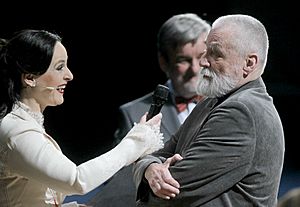Jože Snoj facts for kids
Quick facts for kids
Jože Snoj
|
|
|---|---|

Snoj in 2012
|
|
| Born | 17 March 1934 Maribor, Drava Banovina, Kingdom of Yugoslavia (now in Slovenia) |
| Died | 7 October 2021 (aged 87) |
| Occupation | Poet, writer, essayist |
| Literary movement | Modernism |
| Notable works | Negativ Gojka Mrča, Poslikava notranjščine, Kažipoti brezpotij, Med besedo in Bogom |
| Notable awards | Rožanc Award 1994 for Med besedo in bogom Jenko Award 2004 for Poslikava notranjščine Veronika Award 2009 for Kažipoti brezpotij Prešeren Award 2012 for his lifetime work and his rich literary opus |
| Children | Vid Snoj |
Jože Snoj (born March 17, 1934 – died October 7, 2021) was a famous Slovenian poet, novelist, journalist, and essayist. He wrote many books and poems throughout his life. In 2012, he received the important Prešeren Award for all his amazing work.
Contents
Jože Snoj's Early Life
Jože Snoj was born in Maribor, a city that was part of the Kingdom of Yugoslavia at the time. His family was quite well-off. His uncle, Franc Snoj, was a well-known politician. He was even a minister in the government.
Challenges During Wartime
Life became difficult for Jože and his family during World War II. In April 1941, the Nazis invaded Yugoslavia. Jože's family had to escape from Maribor. They fled to an area in Slovenia called Lower Carniola, which was controlled by Italy.
Later, they had to move again to Ljubljana. This was to avoid problems with the partisan movement, which was led by Communists. These tough experiences from his childhood during the war greatly influenced the stories and poems Jože Snoj wrote later in his life.
Family's Political Struggles
After the war, in 1947, his uncle Franc Snoj faced serious political issues. He was put on trial with other people who wanted to create a legal opposition to the Communist government led by Josip Broz Tito. His uncle was sentenced to 20 years in prison. These events also shaped Jože Snoj's views and his writing.
Jože Snoj's Literary Journey
After finishing his studies in Slavic languages at the University of Ljubljana, Jože Snoj began working as a reporter. He wrote for a newspaper called Delo.
New Ideas in Literature
Jože Snoj was part of a group of writers who brought new ideas to Slovenian literature. They were inspired by the poet Edvard Kocbek. This group, which included writers like Dane Zajc and Gregor Strniša, challenged the traditional way of writing that the Communist government supported.
In 1963, Jože Snoj published his first book of poems, called Mlin stooki (which means "The Mill with Hundred Eyes"). Some people in the literary world criticized it. They thought it had "decadent" or "nihilist" ideas, which meant it explored themes that were considered unusual or negative at the time.
Exploring Faith and Life
As he grew older, Jože Snoj's writing started to explore more spiritual and religious themes. He became interested in Catholicism. You can see this in his works like Žalostinka za očetom in očetnjavo ("Elegies for Father and Fatherland") and Duhovne pesmi ("Spiritual Poems"). These poems often talked about faith and deeper meanings of life.
Famous Novels
Jože Snoj also wrote several well-known novels. One of his most famous is Gavženhrib ("Gallows Hill"). This book is partly about his own childhood during the war. In it, he explores where bad things come from.
Another important novel is Jožef ali zgodnje odkrivanje srčnega raka ("Joseph or the Early Revelation of the Heart Cancer"). In this story, he uses the old story of Joseph in a unique way. He mixes modern ideas with ancient ones, creating a style often called "magic realism." This makes the story feel both real and magical at the same time.
Awards and Recognition
Jože Snoj received several important awards for his writing:
- Rožanc Award in 1994 for his book Med besedo in bogom.
- Jenko Award in 2004 for Poslikava notranjščine.
- Veronika Award in 2009 for Kažipoti brezpotij.
- Prešeren Award in 2012, the highest award in Slovenia for artistic achievements, for his entire body of work.
 | Bessie Coleman |
 | Spann Watson |
 | Jill E. Brown |
 | Sherman W. White |

